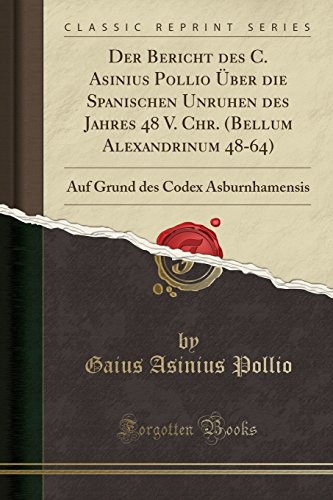Background
Gaius Asinius Pollio was born in 76 B. C. in Teate Marrucinorum, the modern current Chieti in Abruzzi, central Italy.



(Excerpt from Der Bericht des C. Asinius Pollio Über die S...)
Excerpt from Der Bericht des C. Asinius Pollio Über die Spanischen Unruhen des Jahres 48 V. Chr. (Bellum Alexandrinum 48-64): Auf Grund des Codex Asburnhamensis Bezuglich der Handschrift selbst verweise ich auf die Beschreibung derselben von Th. Stangl im Philologus XLV, 2 (1886) p. 213 ff. Und von Wölfflin in der Praefatio seiner mit Miodoriski gefertigten Ausgabe des Bellum Afri cum p. VI. Was die Stellung derselben zu den bis jetzt als besten anerkannten Handschriften uftv anlangt, von denen die beiden ersten die sogenannte römische, die beiden letzten die sogenannte Pariser Familie reprasentieren (vgl. Meusel Jahresberichte XI p. 177 80 gehört A keiner dieser beiden Familien an, vielmehr zeigen sich bald Ueber einstimmungen mit jener, bald mit dieser, doch ist die Zahl der Uebereinstimmungen, wenigstens in unserer Partie, mit UF eine etwas grossers als diejenige mit tv, was nur zu ihren Gunsten spricht. Aber nicht bloss zur Wertschatzung dieser Handschriften und. Zur besseren Erkenntnis ihres gegen seitigen Verhältnisses bietet A die Handhabe, sondern auch manche der sog. Schlechteren Handschriften erhalten durch diese älteste ein neues und besseres Licht. Hatte R. Menge in der Rezension der R. Schneiderschen Ausgabe des Bellum Alexandrinum (berlin 1888) N. Phil. R. 1889 p. 123 schon mit Recht darauf hingewiesen, dass Sch. Dieselben zu ungunstig beurteile, da er in den 78 Kapiteln über 40mal genötigt sei, Lesarten von ihnen aufzunehmen, so zeigt sich jetzt, dass in nicht wenigen Fällen jene guten Lesarten der deteriores auch in A stehen und diese somit direkt oder indirekt von demselben Archetypus wie A abgeschrieben sind. Dies gilt von dem Dresdensz's D, dessen Text von zweiter Hand nach einer A ähnlichen Handschrift abkorrigiert ist, von dem Dresdensis 6 und besonders von dem codex Lavam'ensz's (vgl. Über sie Dübner Praef. P. XXII und XXIII). Letzterer zeigt die auffallendsten Uebereinstimmnngen mit A, namentlich auch in den Schreibfehlern. Man vergleiche. About the Publisher Forgotten Books publishes hundreds of thousands of rare and classic books. Find more at www.forgottenbooks.com This book is a reproduction of an important historical work. Forgotten Books uses state-of-the-art technology to digitally reconstruct the work, preserving the original format whilst repairing imperfections present in the aged copy. In rare cases, an imperfection in the original, such as a blemish or missing page, may be replicated in our edition. We do, however, repair the vast majority of imperfections successfully; any imperfections that remain are intentionally left to preserve the state of such historical works.
http://www.amazon.com/gp/product/1332641717/?tag=2022091-20
Gaius Asinius Pollio was born in 76 B. C. in Teate Marrucinorum, the modern current Chieti in Abruzzi, central Italy.
In 54 he impeached unsuccessfully C. Porcius Cato, who in his tribunate had acted as the tool of the triumvirs. In the civil war between Caesar and Pompey Pollio sided with Caesar, was present at the battle of Pharsalus, and commanded against Sextus Pompeius in Spain, where he was at the time of Caesar's assassination. He subsequently threw in his lot with M. Antonius. In the division of the provinces, Gaul fell to Antony, who entrusted Pollio with the administration of Gallia Transpadana. In superintending the distribution of the Mantuan territory amongst the veterans, he used his influence to save from confiscation the property of the poet Virgil. In 40 he helped to arrange the peace of Brundisium by which Octavian (Augustus) and Antonius were for a time reconciled. In the same year Pollio entered upon his consulship, which had been promised him in 43. It was at this time that Virgil addressed the famous fourth eclogue to him. Next year Pollio conducted a successful campaign against the Parthini, an Illyrian people who adhered to Brutus, and celebrated a triumph on the 25th of October. The eighth eclogue of Virgil was addressed to Pollio while engaged in this campaign. From the spoils of the war he constructed the first public library at Rome, in the Atrium Libertatis, also erected by him, which he adorned with statues of the most celebrated.
(Excerpt from Der Bericht des C. Asinius Pollio Über die S...)
He was married to Quinctia, daughter of Lucius Quinctius, who was executed in 43 BC. Pollio is also notable as the father of Gaius Asinius Gallus Saloninus, a Roman Senator with family connections to the Julio-Claudian house.
